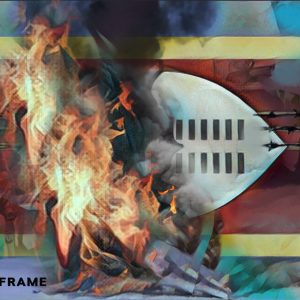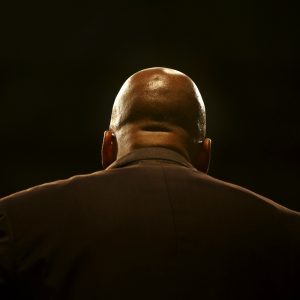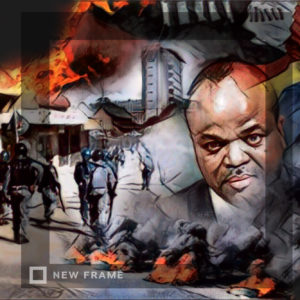End game for Zuma and Mswati
Like the former South African president, the king of eSwatini is destined to fall from grace and power. But as the wheel of history turns, it is imperative to think about viable routes into a just …
Author:
9 July 2021

Across most of southern Africa, former liberation movements run repressive and predatory regimes. The situation is worse in some countries than others, but in Angola, Mozambique, Namibia and Zimbabwe authoritarian and kleptocratic elites preside over systemic impoverishment that is legitimated, perversely, by the history of struggles for national liberation.
eSwatini is a significant exception to this. It is governed by a ruthless, criminal and kleptocratic police state that has recently murdered somewhere between 40 and 70 of its citizens for daring to demand, in the words of one activist, “democracy, freedom, jobs and … food”. Here tyranny is justified in the name of premodern tradition, rather than the modern history of national liberation movements.
Related article:
In South Africa, the ANC was always more than a little tetchy about autonomous organisation. In the early years of the new century, during Thabo Mbeki’s period in office, activists in the Landless People’s Movement and the Western Cape Anti-Eviction Campaign, both autonomous social movements, were subject to torture. But it was under Jacob Zuma that repression developed into regular police killings during street protests, the infamous massacre of striking miners at Marikana in 2012 and frequent assassinations of grassroots activists. Violence inside the party, including routine assassinations, became endemic in KwaZulu-Natal.
The Zuma period was also a period of popular revolt, from street protests organised from shack settlements across the country to the platinum belt, farms in the Western Cape and campuses. A progressive government would have welcomed self-organisation as a means to expand democracy beyond liberal limits and constitute new forms of popular power. But under Zuma, each of these instances of independent organisation was met with state violence, and when there was some participation from the ANC in student struggles, it took the form of attempts to co-opt and redirect the student movement.
The metamorphosis of the ANC
The corruption of the ANC while in government is often dated from the arms deal in 1999, but under Zuma it mutated into a wholesale kleptocracy. By Zuma’s second term, the ANC seemed to have collapsed into a morass similar to that of other former national liberation movements across the region.
A populist posture, leaning towards radical nationalism, was mobilised to legitimate kleptocracy and repression but offered nothing at all to the impoverished majority making their lives amid systemic mass unemployment. Aspirations for land reform, public housing, decent healthcare, employment and so on were smashed by the cynicism of a violent and predatory elite.
The collapse of the ANC’s democratic and social vision did not come out of nowhere. There is a long-standing history of corruption and authoritarianism in the party. In January 1969, Chris Hani and others drafted and signed a memorandum in the Zambian capital of Lusaka declaring their serious concern about nepotism, careerism and, among other things, their view that “the ANC leadership in exile has created a machinery which has become an end in itself”. Instead of being engaged on a democratic basis, they were hauled before a tribunal, expelled from the ANC and, in many accounts, would have been executed if Oliver Tambo had not intervened. It is widely claimed that there was also an informal plan to have Hani murdered.
Related article:
Later on, of course, there was the ruthless crushing of the mutiny at the Pango camp in Angola in May 1984, a mutiny driven by the 1976 generation. There were also the horrors of Quatro, the ANC’s prison camp set up in Angola in 1979, where assault and torture were routine and a number of people lost their lives during the 1980s. The ANC’s department of intelligence and security, known as Imbokodo, was notorious for its paranoia, authoritarianism and violence – including torture and murder. Pallo Jordan, one the movement’s best and most independent intellectuals, was held in isolation by Imbokodo for six weeks in 1983 after accusing it of acting “like a repressive police force”. It has been said that he nearly died of dehydration. Zuma joined Imbokodo in 1985 and became its second in command from 1988, a position he held until 1993.
Like all national liberation movements, the ANC carried multiple currents, including the diplomatic project led by Tambo and participation in the democratic forms of organisation that were present in the trade union movement and the United Democratic Front in the 1980s. But Zuma’s roots are in the party’s most authoritarian current, a current with a long history of corruption.
The rise of ethnic nationalism
In the second half of the 1990s, Zuma enabled large numbers of former Inkatha members to move into the ANC. This brought crude and authoritarian forms of ethnic nationalism into the ANC, an organisation founded in 1912 with a central commitment to unite African people across ethnic lines.
When Zuma was tried for rape in 2006, this ethnic politics, along with grotesque forms of sexism, became normalised. By the time Zuma took the presidency in 2009, amaMpondo, other minorities and non-ethnic popular politics were under openly state-sanctioned attack in shack settlements in Durban.
Related article:
When the staggering extent of Zuma’s betrayal of the struggle that had brought him to power and the people in whose name he ruled became fully apparent in 2017, he turned to both the farcical faux radical populism of “radical economic transformation” and the crude and authoritarian ethnic politics once only associated with Inkatha. These projects met on the terrain of the masculinist performance of militarism.
The absurd idea that elite plunder – at the direct expense of the majority – is some sort of radical programme sometimes echoes aspects of the ideological machinations of Zanu-PF in Zimbabwe. Zuma’s embrace of a form of ethnic reaction does not only echo Inkatha. It is also related to some aspects of the tyranny in eSwatini.
The final collapse of Zuma’s power was a major test for all kinds of actors in society. Some did better than others. The media often played a toxic role in choosing sensation over reason and evidence, continually giving prime space to charlatans in a manner that vastly exaggerated their support and power and normalised public dishonesty.
Unmasking the populists
In recent years, Zuma and his supporters certainly adopted a populist posture, but they were never popular. The increasingly shrill threats to mobilise resistance in support of Zuma ended with a whimper rather than a bang as he left Nkandla to hand himself over to prison officials in Estcourt. Hopefully, it is now finally clear to those who have so much power to shape our public sphere that Carl Niehaus, Mzwanele Manyi, Dali Mpofu and their ilk are pretenders shrieking into the night, pretenders without power, popular support or any kind of meaningful political relevance.
Now that we are no longer cursed with Zuma in the way that we once were, we need to move beyond the national obsession with a singular, although admittedly odious, personality and work towards a general deZumafication, a useful term coined by academic, journalist and former political prisoner Raymond Suttner.
Related podcast:
Mswati will also be deposed from his absolute power. We don’t know when. His state has an effective capacity for violence and an equally effective intelligence network. But the murderous repression of the rebellion that began after the body of Thabani Nkomonye, a law student, was found in a field on 14 May has turned society against the king. The day of his defeat will come.
In South Africa, it is now intensely urgent that it is clearly understood that the project of deZumafication cannot be left to Cyril Ramaphosa and his liberal cheerleaders in non-governmental organisations, business and the media. Ramaphosa’s project of austerity and his complete lack of any progressive economic vision or project to build the power of the oppressed are taking us, hurtling, into another kind of crisis. When Mswati falls, eSwatini will have to be equally clear on the imperative for credible alternatives to his tyranny. These have to be alternatives that can build a viable and democratic future for the majority of emSwati who have endured the suffering of impoverishment year after year, generation after generation.




